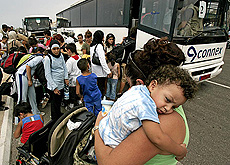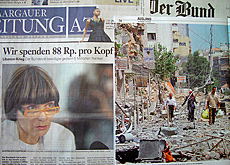Swiss peacekeeper says UN must stay in Lebanon

One of two Swiss military observers in southern Lebanon tells swissinfo it is vital that United Nations peacekeeping troops maintain a presence in the area.
Captain Michael Iseli was speaking after UN officials decided on Friday to pull back unarmed observers from patrol bases after Israel earlier this week bombed a UN post, killing four observers.
For the time being, UN observers have been relocated to peacekeeping headquarters in Nakura.
Iseli, who is a cartographer based in Nakura, said it was becoming increasingly difficult to update maps every day as the road network was deteriorating and there were problems travelling around.
The maps are now being provided to the Swiss-led International Committee of the Red Cross, which moved into the area on Thursday and is trying to help the local population.
Iseli said that although bombs and shells have been flying overhead, there had been no major hit within the perimeter of the Nakura headquarters of Unifil – the UN Interim Force in Lebanon.
swissinfo: How have things changed since the hostilities began?
Michael Iseli: It’s a whole different world. Southern Lebanon three weeks ago really was a kind of hopeful place.
Many Lebanese with dual citizenship – also from Switzerland – had returned, opened up small businesses, and decided not only to come for the summer but also to stay here permanently. All of this has gone. There is literally nothing left in terms of infrastructure. Southern Lebanon will have to be rebuilt from scratch.
swissinfo: You knew personally the four UN military observers that were killed earlier this week. What thoughts have been going through your head?
M.I.: We don’t really have much time at the moment to have a proper mourning process. Of course, when you lose four friends that is traumatic but there are more people out there and we have to keep on going, not only for ourselves but also for the whole of southern Lebanon.
We have to stay professional and focus on our work. The rest will certainly come back to us later on. We shouldn’t push that away.
swissinfo: How dangerous is your job?
M.I.: There is always a certain amount of danger involved in peacekeeping missions and all the Swiss who volunteer for such missions are fully aware of that. What bothered me, I have to say, was that in previous missions I buried friends of mine because they were in the wrong place at the wrong time.
Here, the situation was completely different. There were warnings given to Israel that they were actually targeting our positions and the fact that they didn’t stop shows to me a certain attitude that I don’t like.
swissinfo: What does your family think of all this?
M.I.: I am in a rather privileged position. My wife was doing similar work for the Greek foreign ministry – because she is Greek – before our son was born. She can deal with it, but of course she worries. Our son is six so he is still too little to understand and I truly believe he doesn’t have to understand all what is going on. We don’t have to take his innocence away.
swissinfo: Are you still in a position to update maps?
M.I.: There’s not much change but we have had a warning to be prepared to assist humanitarian organisations in the area, so we’ve started to liaise with bodies like the UNHCR [High Commissioner for Refugees] and the ICRC [International Committee of the Red Cross].
And we’re exchanging the village mapping data that we’ve acquired over the years in order for them to work on the ground more quickly. More and more it’s [a question of] working in a humanitarian context. I’ve run such operations before in the Balkans.
swissinfo: How important is your job?
M.I.: For the UN, it’s terribly important that we keep a presence in order for both parties [Israel and Hezbollah] – I’m not judging one or the other – to be reminded that there are eyes [watching on behalf of the international community and mainly the UN Security Council in New York] to see what they are doing.
swissinfo: But do you really think you can help in peace efforts, unarmed as you are except for a pair of binoculars?
M.I.: I guess the decision taken in New York to relocate the patrol bases shows clearly that at the moment it is very, very difficult to have an actual influence on the course of action taken by the two parties. It’s almost impossible.
Yet we cannot just leave the civilian population to the mercy of whatever is happening. It is vital that we stay here but we certainly can’t stop the fighting.
swissinfo-interview: Robert Brookes
The fighting – the worst since Israel invaded southern Lebanon in 1982 – was triggered after Hezbollah seized two Israeli soldiers in a cross-border raid two weeks ago.
The Islamic militant movement is part of the Lebanese government and is backed by Syria and Iran.
The fighting has killed more than 400 people in Lebanon and more than 50 in Israel.
Aid experts estimate that some 800,000 people have been displaced and need shelter, water as well as medical assistance and care.

In compliance with the JTI standards
More: SWI swissinfo.ch certified by the Journalism Trust Initiative











You can find an overview of ongoing debates with our journalists here . Please join us!
If you want to start a conversation about a topic raised in this article or want to report factual errors, email us at english@swissinfo.ch.